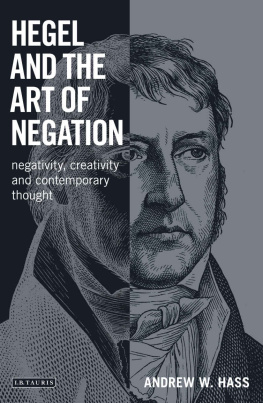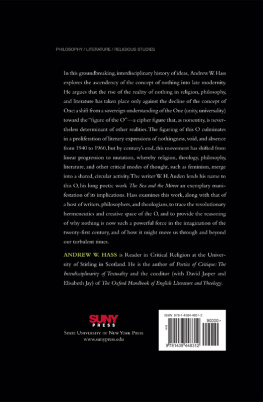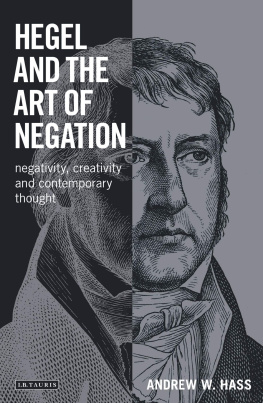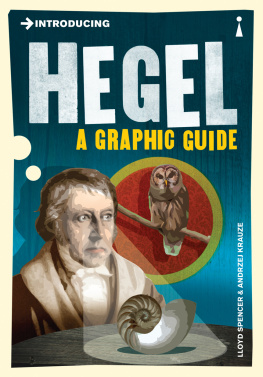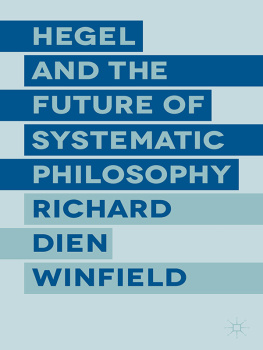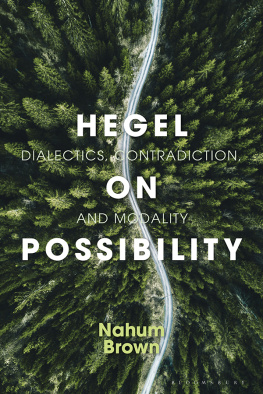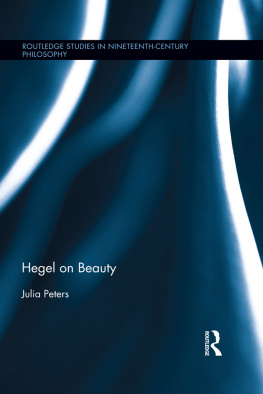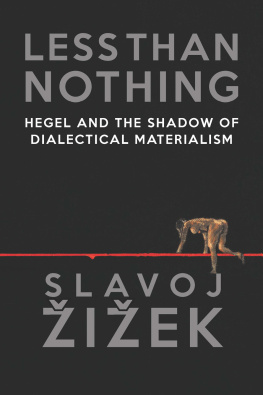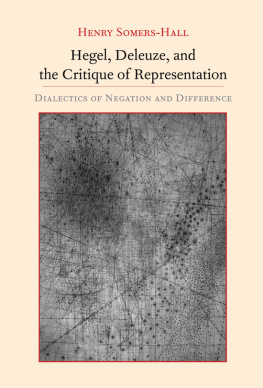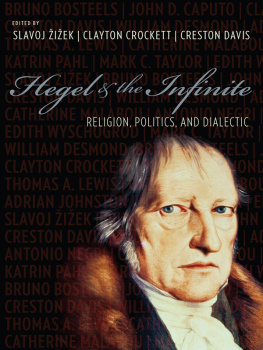Andrew W. Hass is Reader in Religion at the University of Stirling and Executive General Editor of the journal Literature and Theology . He is the author of Audens O: The Loss of Ones Sovereignty in the Making of Nothing (2013) and Poetics of Critique: The Interdisciplinarity of Textuality (2003), and co-editor of The Oxford Handbook of English Literature and Theology (2007, with David Jasper and Elisabeth Jay).
Andrew Hass Hegel and the Art of Negation is a comprehensive and magisterial rethinking of Hegel, not only calling forth a truly contemporary Hegel, but a new Hegel: a Hegel at the very center of thinking as such, and of all thinking, or all truly critical and universal thinking.
Thomas J.J. Altizer, Professor Emeritus of Religious Studies, The State University of New York, Stony Brook
This is an engaging and provocative exploration of the Hegelian art of negation. It offers us an attentive and insightful reading of the Hegel of negation, as well as of the negation of Hegel by many significant contemporary thinkers. It represents a fertile return to Hegel, a return of Hegel, and illuminates the central significance of the triad art/religion/philosophy. Its fresh consideration of the importance of this triad is especially worthy of commendation. Andrew Hass is well informed about Hegel himself as well as the latters commentators and critics. Throughout one finds touches of rhetorical playfulness that serve to intrigue the reader. The book is important for trying to bring Hegels view of art into proper communication with the full dimensions of Hegels overall philosophical venture.
William Desmond, Professor of Philosophy, Katholieke Universteit Leuven and David R. Cook Visiting Professor of Philosophy, Villanova University, author of Hegels God
Here is a truly artistic homage to the artistry at the heart of Hegels thought: the sheer restless negativity that forever differentiates Hegel from Hegelianism, or perhaps Hegelianism from other -isms. In this enjoyable text Hegel returns negating the negation he must, of course, also undergo as freshly thought-provoking and challenging as ever.
Andrew Shanks, Canon Theologian, Manchester Cathedral, author of Hegels Political Theology and of Hegel and Religious Faith

Published in 2014 by I.B.Tauris & Co Ltd
6 Salem Road, London W2 4BU
175 Fifth Avenue, New York NY 10010
www.ibtauris.com
Distributed in the United States and Canada
Exclusively by Palgrave Macmillan
175 Fifth Avenue, New York NY 10010
Copyright 2014 Andrew W. Hass
Cover illustration: Portrait of Georg F. Hegel (17701831), German philosopher (photo by Time Life Pictures/Mansell/Getty Images)
The right of Andrew W. Hass to be identified as the author of this work has been asserted by him in accordance with the Copyright, Designs and Patents Act 1988.
All rights reserved. Except for brief quotations in a review, this book, or any part thereof, may not be reproduced, stored in or introduced into a retrieval system, or transmitted, in any form or by any means, electronic, mechanical, photocopying, recording or otherwise, without the prior written permission of the publisher.
Library of Modern Religion vol. 37
ISBN: 978 1 78076 557 0 (HB)
978 1 78076 558 7 (PB)
eISBN: 978 0 85773 468 6
ePDF: 978 0 85772 849 4
A full CIP record for this book is available from the British Library
A full CIP record is available from the Library of Congress
Library of Congress Catalog Card Number: available
Text design, typesetting and eBook by Tetragon, London
For Tom Altizer, our Black Monk
Contents
Acknowledgements
This book is the culmination of a long process in rethinking Hegel that began with thinking upon, properly and perhaps for the first time, the idea of nothing. One soon realises that to make nothing or nothingness the object of thinking, one must first marshal into service a preposition one thinks around , about , upon or within nothing before one can think nothing directly, if at all. The preposition acts as a pre-position before the assumption of any direct position per se. I found that this pre-position became my previous book, Audens O: The Loss of Ones Sovereignty in the Making of Nothing , the writing of which, in the end, overlapped with this book, but which nevertheless still, in many ways, acts as its propaedeutic. Of course, this present text does not in itself achieve thinking nothing directly or immediately, a thinking which may ultimately be, as Parmenides taught us, impossible. At best it achieves the thinking of nothing, which remains prepositionally constructed, but now, as I will argue below, with the ambiguities of the genitive potently and productively in play. Hence the art of negation.
Even the thinking of nothing, as the art of negation, requires bold commitment, and I am extremely grateful to Alex Wright for his belief and immense patience in the process just described. I am also indebted to all my interlocutors around Hegel, living and passed on, many of whom feature in the argument to follow, and some of whom have helped situate previous thinking and iterations. Chapter 7, most notably, is a well reworked chapter first presented at Chicagos Divinity School in 2010 and published later in a volume on ethics, Theological Reflection and the Pursuit of Ideals Theology, Human Flourishing and Freedom , edited by David Jasper and Dale Wright (Ashgate, 2013).In whatever context or discipline and this book, like its predecessor, embraces interdisciplinarity unreservedly, out of a necessity inherent in its theme we have all been learning and re-learning to think Hegel directly, which is necessarily a thinking of Hegel, and, by turn, his very negation.
INTRODUCTION
Returning Anew
Hegel is on the move again. Or, Hegel is again circling back on himself. Or, Hegel is making a beginning again.
Each of these is a permutation of recurrence within Hegels thought; but each is also a permutation of recurrence happening right now, with Hegels thought. What accounts for these recurrences of Hegel? Why does Hegelian thought, which has already had such profound influence, keep resurging, and why a renaissance now, in this early millennium wracked by historical circumstances that seem so counter to the Hegelian understanding of dialectical historical progress?
Is it because the within and the with converge: the very content of Hegels thought enacts itself in the form in which it is received and appropriated by subsequent generations? Or is it because this very convergence, as synthesis of form and content, is itself played out both within Hegels thought and with Hegels thought, in a multivalency of syntheses? Or is it that such multivalency is self-confirming, in the manner that Hegels thought had determined: what happens within our individual thinking is precisely what develops or is made manifest with our collective thinking in the world?
Or is it because, to use Hegels own terminology, the in-itself of Hegels thought becomes the for-itselfof Hegelian thought, which in turn becomes the in-and-for-itselfof a Hegelianism , remade or refuted in contemporary terms?
Does such a cultural return to Hegel mean, in sum, a confirmation of Hegels own thought? And does it mean this only by way of its dis-confirmation moving on from, circling back on, beginning anew any kind of Hegelianism, once more?
All these questions, dense as they first appear, form the thematics of this book and its central question: what accounts for Hegels continual recurrence, both now and always? And the permutations of that recurrence moving, circling, making, beginning form the essence of its argument: Hegel keeps permuting (himself) .
Next page
